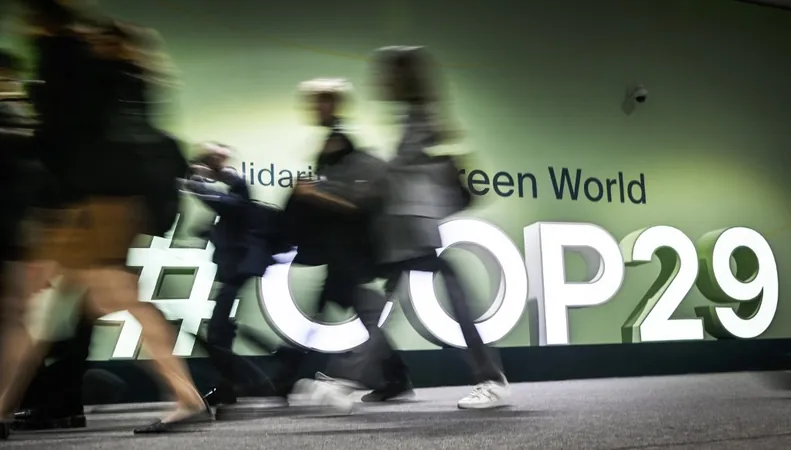
COP29: Alarm Bells Ring as New Climate Research Raises Stakes
2024-11-12
Author: Mei
COP29: Alarm Bells Ring as New Climate Research Raises Stakes
This year’s U.N. climate summit, COP29, takes place against a backdrop of unprecedented global temperatures, intensifying the urgency for actionable solutions to combat climate change. The latest scientific findings indicate that the climate crisis is accelerating quicker than previous models projected.
Has the 1.5°C Threshold Already Been Crossed?
A new study suggests the world may have already exceeded the crucial threshold of 1.5 degrees Celsius (2.7°F) warming compared to pre-industrial levels—an alarming marker beyond which the risks of severe climate impacts could become irreversible. Traditional assessments have relied on temperature averages from 1850-1900. Yet this fresh analysis, utilizing 2,000 years of atmospheric data from Antarctic ice cores, points to a longer pre-industrial baseline, indicating current temperatures may be closer to 1.3°C (2.4°F) of warming. Regardless, 2024 is poised to be the hottest year recorded, emphasizing the need for immediate action.
Supercharged Storms: A New Era of Hurricanes
The warming oceans are not just making storms stronger; they are also making them intensify at an alarming rate. For instance, Hurricane Milton went from a tropical storm to the Gulf’s second-most powerful hurricane on record in just 24 hours. Warmer air can retain more moisture, resulting in heavier rainfall and greater flooding, impacting areas far from the coast — as demonstrated by Hurricane Helene's effects on mountainous regions like Asheville, North Carolina.
Wildfire Risks and Health Hazards
The rise in global temperatures is leading to widespread drought, resulting in more frequent and intense wildfires across North America and Europe. Recent research indicated that approximately 12,000 deaths in the 2010s were linked to wildfire smoke exacerbated by climate change. As forests dry out, the risks of destructive wildfires only escalate, leaving a legacy of smoke and health hazards in their wake.
Coral Reefs on the Brink
Currently, the world is experiencing the largest recorded mass coral bleaching event, raising concerns that many coral ecosystems may have crossed their point of no return. Researchers are hopeful for signs of recovery in bleached reefs, but the outlook remains grim as rising sea temperatures continue to pose existential threats.
Amazon in Crisis
The Amazon rainforest is facing its worst drought since 1950, with river levels plummeting to historic lows. Earlier studies predict that by 2050, between 10% and 47% of the Amazon could experience dire heat and drought conditions exacerbated by climate change. This phenomenon threatens to change the rainforest into less stable ecosystems, potentially transforming lush jungles into sandy savannas.
Volcanic Activity on the Rise?
A shocking new fear is emerging: climate change may trigger increased volcanic activity. In Iceland, researchers observe that retreating glaciers are reducing pressure on the Earth's crust, potentially leading to a greater number of volcanic eruptions. Around 245 volcanoes worldwide are situated beneath ice and may be at risk, creating an urgent call for further investigation.
Americas' Altered Ocean Patterns
Warming Atlantic waters may be putting the Atlantic Meridional Overturning Circulation (AMOC) at risk of collapse, a critical system that has historically moderated European winters. Past research showed a 15% weakening of the AMOC since 1950, casting further doubt on its stability in light of ongoing climate changes.
As COP29 unfolds, the scientific community, governments, and institutions confront a stark reality—climate change is not a distant threat but an immediate crisis that demands urgent, coordinated action on a global scale. The time to act is now, before these alarming projections become irrevocable realities.







 Brasil (PT)
Brasil (PT)
 Canada (EN)
Canada (EN)
 Chile (ES)
Chile (ES)
 España (ES)
España (ES)
 France (FR)
France (FR)
 Hong Kong (EN)
Hong Kong (EN)
 Italia (IT)
Italia (IT)
 日本 (JA)
日本 (JA)
 Magyarország (HU)
Magyarország (HU)
 Norge (NO)
Norge (NO)
 Polska (PL)
Polska (PL)
 Schweiz (DE)
Schweiz (DE)
 Singapore (EN)
Singapore (EN)
 Sverige (SV)
Sverige (SV)
 Suomi (FI)
Suomi (FI)
 Türkiye (TR)
Türkiye (TR)